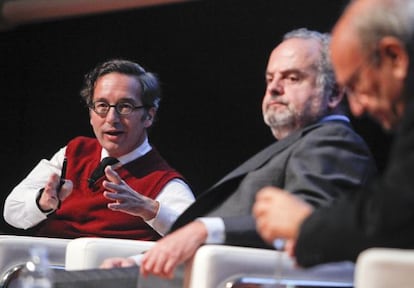The endless wait for the Popular Party’s Patronage Law
A bill that would encourage private spending in the arts is facing stiff opposition The Treasury is not keen to support legislation that encourages tax exemptions


Spain's secretary of state for culture, José María Lassalle, doesn't like mixing politics with metaphors. Nor with dialectics, although on Tuesday he had no choice but to deal head on with a riled-up audience at the IV Cultural Industries Forum - organized at the Reina Sofía museum in Madrid by the Santillana and Alternativas foundations - when discussing financing for the sector.
Lassalle dealt with the tense atmosphere with quotes from Adorno, Wittgenstein and Thomas Mann, but he may have forgotten the author who would best be able to define the turns the Popular Party (PP) government's star cultural proposal, the Patronage Law, is taking: Franz Kafka.
The Patronage Law - which aims to encourage more spending on the arts in the private sector by improving tax breaks to patrons - is following a course that could indeed be described as Kafkaesque. In order to deal with the current crisis in the sector, the legislation is crucial. It will change, enliven and facilitate the survival of a sector that is withering as a result of a series of public cuts. But where is this legislation, considered to be a priority at the beginning of the PP's term?
A "draft of a draft"
"For now, it's a rough draft of a draft bill," said deputy director of cultural industries at the Culture Ministry, Faustino Díaz Fortuny, on Tuesday. According to the picture Lassalle is painting, moving the project forward is costing blood, sweat and tears.
One of the phrases the culture chief used on several occasions at the forum in reference to the progress was: "Thanks to the personal efforts of a few..." But it would appear these efforts are being thwarted by a number of obstacles being put up by the Treasury. Finance Minister Cristóbal Montoro, it seems, is not a big fan of legislation that encourages tax exemptions.
That particular problem was highlighted by Pedro Pérez, the president of the Association of Audiovisual Producers. "In order to defend its proposals," he said, "the government must show itself to be a single representative, and not a whole host, all of whom are dependent on the positions that the Culture Ministry or the Treasury take. We have a government in which they discuss taxes in the Culture Ministry and they discuss culture in the Treasury."
And that's not to mention the bleak panorama left behind by public spending cuts of around 30 percent and the hike in value-added tax to 21 percent, "the highest in Europe," according to Nicolás Sartorius, the vice-president of the Alternativas Foundation. In his opinion, we are living through "a genuine tsunami that's crashing down on the sector."
The law is needed, according to Francesca Mingella, the president of Art Partners España, "to save the furniture." But nor should it serve as an excuse for the public sector to wash its hands of culture.
Lassalle argued that the sector is a matter for the state, and openly defended the Anglo-Saxon model of encouraging civil society to participate in the arts.
"The Patronage Law is not something for the rich," he said. But the situation is desperate. If nothing is done, a sector that accounts for four percent of GDP and employs a million people could be left irreparably damaged. "In percentage terms," Lassalle explained, "the sector could suffer damage similar to that of the construction sector in Spain."
Tu suscripción se está usando en otro dispositivo
¿Quieres añadir otro usuario a tu suscripción?
Si continúas leyendo en este dispositivo, no se podrá leer en el otro.
FlechaTu suscripción se está usando en otro dispositivo y solo puedes acceder a EL PAÍS desde un dispositivo a la vez.
Si quieres compartir tu cuenta, cambia tu suscripción a la modalidad Premium, así podrás añadir otro usuario. Cada uno accederá con su propia cuenta de email, lo que os permitirá personalizar vuestra experiencia en EL PAÍS.
¿Tienes una suscripción de empresa? Accede aquí para contratar más cuentas.
En el caso de no saber quién está usando tu cuenta, te recomendamos cambiar tu contraseña aquí.
Si decides continuar compartiendo tu cuenta, este mensaje se mostrará en tu dispositivo y en el de la otra persona que está usando tu cuenta de forma indefinida, afectando a tu experiencia de lectura. Puedes consultar aquí los términos y condiciones de la suscripción digital.








































